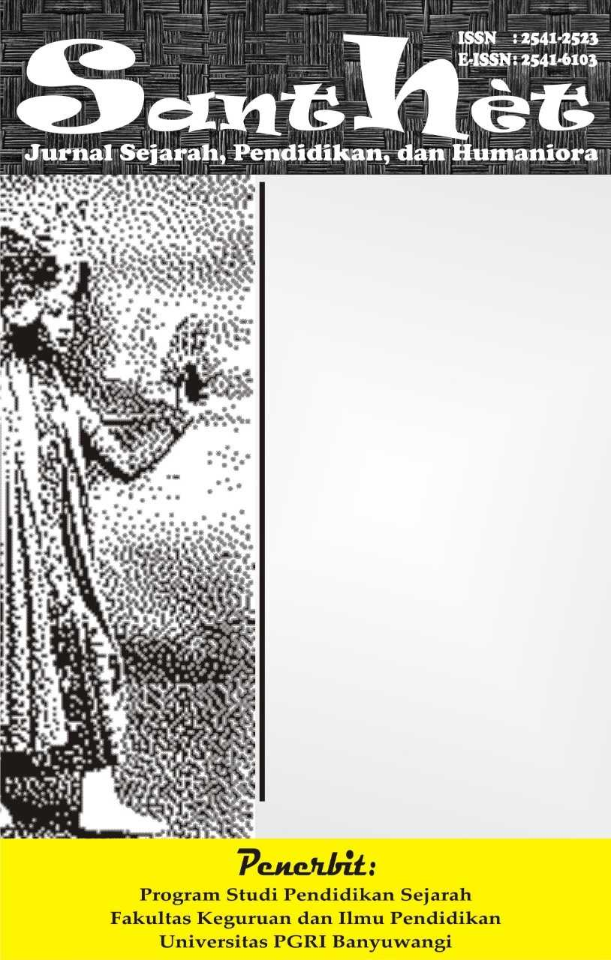Generation Z’s Engagement in Palestine Advocacy on TikTok
DOI:
https://doi.org/10.36526/santhet.v8i2.4588Keywords:
Generation Z, Public Sphere, Social Advocacy TikTokAbstract
The public sphere serves as a platform where individuals can openly and fairly share ideas and knowledge without the influence of particular authorities, fostering democratic discussions. Today, social media holds the potential to create a public sphere for its users, functioning not only as a channel for information exchange but also as a platform for social advocacy on global issues. TikTok, a popular social media among Generation Z, provides a space for their engagement in global issues, including the Palestinian solidarity movement. The involvement of Generation Z in TikTok allows them to access and voice their perspectives on global matters, making this platform a public sphere that supports social participation and advocacy on an international level. This study employs qualitative phenomenology with Jürgen Habermas’ public sphere theory to analyze how TikTok forms a public sphere. The study aims to understand why Generation Z uses TikTok as a medium for social advocacy, specifically in supporting Palestinian solidarity. Findings indicate that TikTok functions as a public sphere aligned with Habermas' theory, effectively providing Generation Z with a space for expressing support for Palestine. TikTok's characteristics enable open interaction and participation, meeting Generation Z’s need for engagement in global issues and active social advocacy.
References
Angga, S., Poa, A. A. P., & Rikardus, F. R. (2023). Etika Komunikasi Netizen Indonesia di Media Sosial sebagai Ruang Demokrasi dalam Telaah Ruang Publik Jurgen Habermas. Jurnal Filsafat Indonesia, 6(3), 384–393.
Fathiyah, F. (2023). TikTok dan Kebebasan Berekspresi Di Ruang Digital Bagi Generasi Z. MEDIALOG: Jurnal Ilmu Komunikasi, 6(1), 166–177. https://doi.org/10.35326/medialog.v6i1.4139
Firamadhina, F. I. R., & Krisnani, H. (2021). PERILAKU GENERASI Z TERHADAP PENGGUNAAN MEDIA SOSIAL TIKTOK: TikTok Sebagai Media Edukasi dan Aktivisme. Share : Social Work Journal, 10(2), 199. https://doi.org/10.24198/share.v10i2.31443
Fuchs, C. (2021). The digital commons and the digital public sphere: How to advance digital democracy today. Westminster Papers in Communication and Culture, 16(1), 9–26. https://doi.org/10.16997/WPCC.917
Genoveva, G. (2022). Tiktok Platform Opportunity: How Does it Influence SMES Brand Awareness among Generation Z? Sriwijaya International Journal of Dynamic Economics and Business, January, 273–282. https://doi.org/10.29259/sijdeb.v5i3.273-282
Habermas, J. (1989a). The Structural Transformation of the Public Sphare : An Inquiry into a Category of Bourgeois Society. The MIT Press.
Habermas, J. (1989b). The Theory of Communicative Action, volume 1: Reason and the rationalization of society. Beacon Press.
Ilbasmiş, V. S. (2022). A THEORETICAL APPROACH TO THE PUBLIC SPACE CONCEPT EVOLUTION : FROM HABERMAS TO INTERNET , BIG DATA AND SOCIAL MEDIA. 12(3).
Imadah Thoyyibah, Dwiputri Maharani, S., Alamsyah, R., & Rosmala, R. (2024). Landasan Etik Nilai Keberpihakan Fatwa MUI No.83 Tahun 2023 Tentang Dukungan Terhadap Perjuangan Palestina. Jurnal Pendidikan, Sains Sosial, Dan Agama, 9(2), 41–54. https://doi.org/10.53565/pssa.v9i2.1013
Ismail, A. R., Nguyen, B., Chen, J., Melewar, T. C., & Mohamad, B. (2021). Brand engagement in self-concept (BESC), value consciousness and brand loyalty: a study of generation Z consumers in Malaysia. Young Consumers, 22(1), 112–130. https://doi.org/10.1108/YC-07-2019-1017
Johnson, R. B., & Onwuegbuzie, A. J. (2004). Mixed Methods Research: A Research Paradigm Whose Time Has Come. Educational Researcher, 33(7), 14–26. https://doi.org/10.3102/0013189X033007014
Jubba, H., Baharuddin, T., Pabbajah, M., & Qodir, Z. (2020). Dominasi Internet di Ruang Publik: Studi Terhadap Penyebaran Wacana Gerakan Bela Islam 212 di Indonesia. Al-Izzah: Jurnal Hasil-Hasil Penelitian, 15(1), 1. https://doi.org/10.31332/ai.v0i0.1631
Kaslam. (2024). Solidaritas Global: Gerakan Kemanusiaan Untuk Palestina Di Indonesia. In Jurnal Ushuluddin (Vol. 26, Issue 1). https://journal.uin-alauddin.ac.id/index.php/alfikr/article/view/45592
Kurzrock, E. (2019). Intensified Play: Cinematic study of TikTok mobile app. University of Southern California, 1–12. https://www.academia.edu/40213511/Intensified_Play_Cinematic_study_of_TikTok_mobile_app
Lin, H. (2022). Is TikTok a Public Sphere for Democracy in China? A Political Economy Approach. 9th European Conference on Social Media, ECSM 2022, 88–94. https://doi.org/10.34190/ecsm.9.1.139
Playstore. (2024). Most Popular Free Apps in Android Apps Category. Play.Google.Com. https://play.google.com/store/apps
Rafid Sugandi, & Riri Anggraini. (2024). Gerakan Sosial: Aksi Bela Palestina Boikot Produk Israel Di Kota Padang 2017-2023. CENDEKIA: Jurnal Ilmu Sosial, Bahasa Dan Pendidikan, 4(2), 01–17. https://doi.org/10.55606/cendikia.v4i2.2482
Riyanto, G. P., & Pertiwi, W. K. (2023). Pengguna TikTok Indonesia Tembus 113 Juta, Terbesar Kedua di Dunia. Kompas.Com. https://tekno.kompas.com/read/2023/07/10/11000067/pengguna-tiktok-di-indonesia-tembus-113-juta-terbesar-kedua-di-dunia#google_vignette
Solihin, R., Juni, H., Saragih, R., Setiawan, B., & Widodo, P. (2023). Indonesia’s Role in the Israel-Palestine Conflict Through Multi-Track Diplomacy. Perspektif, 12(3), 1002–1013. https://doi.org/10.31289/perspektif.v12i3.9490
Sugihartati, R. (2014). Perkembangan Masyarakat Informasi dan Teori Sosial Kontemporer (Edisi Pert). Kencana Prenadamedia Group.
Suratiningsih, D., Pupita, D., & Safira, S. (2020). Diplomasi Perdamaian Dan Kemanusian Indonesia Dalam Isu Palestina Pada Tahun 2014-2020. (PROYEKSI Jurnal Ilmu-Ilmu Sosial Dan Humaniora PROYEKSI Jurnal Ilmu-Ilmu Sosial Dan Humaniora (e-Journal)), 25(1), 11. https://doi.org/10.26418/proyeksi.v25i1.2602
Thakur, A. K. (2020). New Media and the Dalit Counter-public Sphere. Television and New Media, 21(4), 360–375. https://doi.org/10.1177/1527476419872133
Wiwoho, R. P. (2020). Makna Penggunaan Aplikasi Tik Tok pada Generasi Z (Studi Fenomenologi terhadap Pengguna Aplikasi Tik Tok). Universitas Multimedia Nusantara.
Yu, J. X. (2019). Research on TikTok APP Based on User-Centric Theory. Applied Science and Innovative Research, 3(1), 28. https://doi.org/10.22158/asir.v3n1p28





























